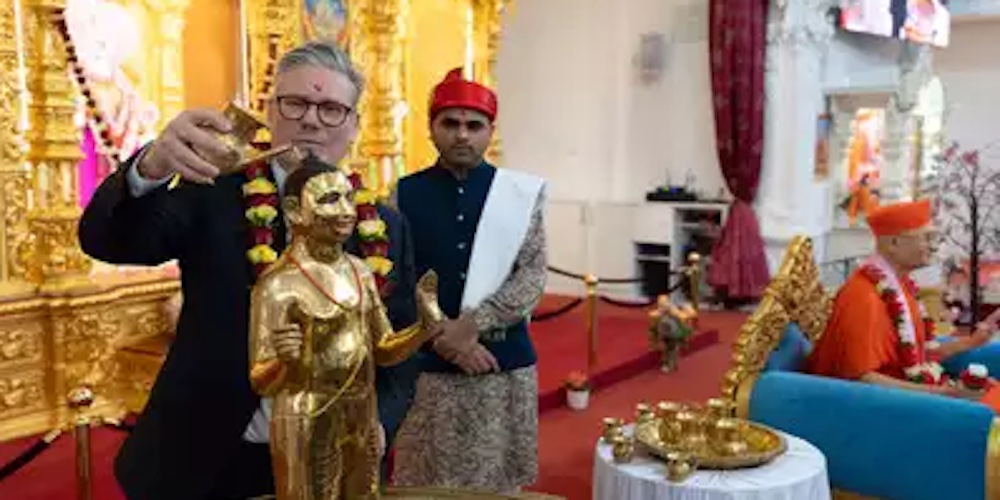Can Labour Rebuild the Bridge with Bharat?

British Prime Minister Keir Starmer may have to work overtime to mend Labour ways and breath fresh life into UK ties with Bharat
Relationship between the United Kingdom and Bharat has always been complex, evolving and shaped by their checkered past. Today, these ties are transforming into modern partnership.
With the Labour Party storming back to power under Keir Starmer, UK-India relations are entering a new phase that demands careful attention. Labour Party’s past actions and current stance on Bharat-related issues might impact these ties particularly considering growing influence of the British Indian community.
Labour Party on Bharat
Labour Party hasn’t always been on the best terms with Bharat, especially during key moments in recent history. In 2019, under Jeremy Corbyn’s leadership, the Labour Party adopted a controversial resolution calling for “international intervention in Kashmir” and even mooted a UN-led referendum. This move came right after India abrogated Article 370 which revoked special status to Jammu and Kashmir. The timing and content of the resolution were seen by many as aligning with Pakistan’s stance on Kashmir and as an anti-India position.
The backlash was immediate. Over 100 Indian organizations wrote to Corbyn expressing their strong disapproval. The response wasn’t just limited to letters of protest. Several British-Indian voters who had supported Labour felt betrayed and shifted to the Conservative Party in the following elections. The result? Significant losses for Labour were attributed to their stance on Kashmir.
Recognizing the damage done, Labour Party chairman Ian Lavery publicly acknowledged that the Kashmir resolution had offended not just India but British Indians as well. In a bid to repair relations, Lavery assured that Labour would not take sides—neither pro-India nor pro-Pakistan—on the Kashmir issue, signalling an attempt to distance the party from Corbyn’s earlier position. This promise, reported by The Guardian, was a clear effort to regain the trust of British-Indian voters who felt alienated by Labour’s earlier approach.
Similarly, during farmers’ protests in Bharat during 2020 – 21, Keir Starmer and some Labour MPs voiced concerns about the Indian government’s handling of the situation citing human rights issues. While their concerns were claimed to be framed around human rights, it highlighted their stance on Bharat’s domestic affairs which is not acceptable for a nation like Bharat with better political stability than UK in the recent past.

British Indian Community and its Political ‘voice’
Understanding the need to mend ties with the British Indian community, Keir Starmer has made significant efforts to rebuild trust. His visit to Swaminarayan temple in Kingsbury where he stated that “There is no place for Hinduphobia in the UK,” was a clear attempt to reach out to the community. He also emphasized Labour’s intention to build a new strategic partnership with Bharat, marking a shift from the party’s previous positions.
The British Hindu community with nearly 983,000 people in England and Wales has become a significant political force (ONS, 2021). Historically seen as Labour vote bank, this community has grown more assertive in recent years, making it clear that their support is not guaranteed. The launch of ‘Hindu Manifesto’ reflects this change, aiming to bring Hindu voices into mainstream political discussions and ensure that their concerns are addressed (The Times, 2023).
Future of UK-Bharat Relations
With the Labour Party back in power, the future of UK-Bharat relations is at a crossroads. Keir Starmer’s recent efforts to engage with the British Indian community and his commitment to a stronger partnership with Bharat are promising signs. However, it’s crucial that the Labour Party goes beyond words and takes actions that respect Bharat’s sovereignty and address concerns of the British Indian diaspora (The Times, 2021).
From Bharat’s perspective, there is cautious optimism that the Labour Party will adopt a more nuanced and informed approach to bilateral relations under Starmer’s leadership. The success of UK-Bharat ties will depend on how well the Labour Party can navigate this complex relationship acknowledging the growing influence of British Indian community while fostering mutual respect and cooperation.
(Author is Alumnus of London School of Economics and a doctoral scholar at University of Delhi. He works at Rishihood University)
Courtesy – Centre for Integrated and Holistic Studies


